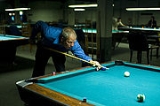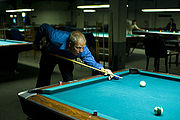
Pool hall
Encyclopedia

A billiard/billiards, pool or snooker hall (or parlour/parlor
Parlour
Parlour , from the French word parloir, from parler , denotes an "audience chamber". In parts of the United Kingdom and the United States, parlours are common names for certain types of food service houses, restaurants or special service areas, such as tattoo parlors...
, room or club; sometimes compounded as poolhall, poolroom, etc.) is a place where people get together for playing cue sports such as pool
Pocket billiards
Pool, also more formally known as pocket billiards or pool billiards , is the family of cue sports and games played on a pool table having six receptacles called pockets along the , into which balls are deposited as the main goal of play. Popular versions include eight-ball and nine-ball...
, snooker
Snooker
Snooker is a cue sport that is played on a green baize-covered table with pockets in each of the four corners and in the middle of each of the long side cushions. A regular table is . It is played using a cue and snooker balls: one white , 15 worth one point each, and six balls of different :...
or carom billiards. Such establishments often serve alcohol
Alcoholic beverage
An alcoholic beverage is a drink containing ethanol, commonly known as alcohol. Alcoholic beverages are divided into three general classes: beers, wines, and spirits. They are legally consumed in most countries, and over 100 countries have laws regulating their production, sale, and consumption...
and may have gaming machines
Arcade game
An arcade game is a coin-operated entertainment machine, usually installed in public businesses such as restaurants, bars, and amusement arcades. Most arcade games are video games, pinball machines, electro-mechanical games, redemption games, and merchandisers...
, darts
Darts
Darts is a form of throwing game where darts are thrown at a circular target fixed to a wall. Though various boards and games have been used in the past, the term "darts" usually now refers to a standardised game involving a specific board design and set of rules...
, foosball and other games on the side.
Public perception
In North America in the 1950s and 1960s especially, pool halls in particular were perceived as a social ill by many, and laws were passed in many jurisdictions to set age limits at pool halls and restrict gambling and the sale of alcohol. The song "Trouble" in the 1957 hit musical The Music ManThe Music Man
The Music Man is a musical with book, music, and lyrics by Meredith Willson, based on a story by Willson and Franklin Lacey. The plot concerns con man Harold Hill, who poses as a boys' band organizer and leader and sells band instruments and uniforms to naive townsfolk before skipping town with...
lampooned this prejudice (even contrasting carom billiards, requiring "judgement, brains, and maturity", versus pool, said to be a gateway to laziness, gambling, smoking and philandering). Public perception had changed considerably by the 1990s.
In popular culture
Pool halls necessarily feature prominently in the novel and film The HustlerThe Hustler (film)
The Hustler is a 1961 American drama film directed by Robert Rossen from the 1959 novel of the same name he and Sidney Carroll adapted for the screen...
, and their sequel book and movie, The Color of Money
The Color of Money
The Color of Money is a 1986 film directed by Martin Scorsese from a screenplay by Richard Price, based on the 1984 novel of the same name by Walter Tevis....
, as well as other pool films such as Poolhall Junkies
Poolhall Junkies
Poolhall Junkies is a 2002 drama/thriller film written, starring and directed by Mars Callahan. The film also stars Alison Eastwood, Michael Rosenbaum, Rick Schroder with Chazz Palminteri and Christopher Walken...
and Shooting Gallery
Shooting Gallery (film)
Shooting Gallery is a 2005 film directed by Keoni Waxman starring Freddie Prinze, Jr.. The plot consists of a young hustler who meets his match in a veteran pool player and small-time gangster ....
. The historic depth of American pool halls and their subculture was touched on in The Color of Money in various ways, including dialogue extolling the virtues of particular landmark venues, the disappointment at discovering one such hall's closure, a comment that regulars at a well-known hall "never leave the street" it is on, and the return of a pool hall janitor in The Hustler as a hall owner decades later in the sequel.

